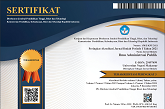Determinants of Employee Performance: The Role of Leadership Style, Competence, Integrity and Work Motivation
(1) Universitas Negeri Padang
(2) Universitas Negeri Padang
(*) Corresponding Author
DOI: https://doi.org/10.26858/jiap.v12i2.35408
Abstract
Keywords
Full Text:
PDFReferences
Ali, M. (2017). Kebijakan pendidikan menengah dalam perspektif governance di indonesia. Universitas Brawijaya Press.
Anderson, N., Ones, D. S., Sinangil, H. K., & Viswesvaran, C. (2001). Handbook of industrial, work & organizational psychology: Volume 1: Personnel psychology. Sage.
Ardi, R. P., & Sukmasari, N. (2016). Pengaruh Disiplin Kerja, Promosi Jabatan dan Kompensasi Terhadap Kinerja Pegawai pada Dinas Kebudayaan Pariwisata Pemuda dan Olahraga Kabupaten Rembang. Ebbank, 7(2), 105–110.
Basori, M. A. N., Prahyawan, W., & Kamsin, D. (2017). The Effect of Employee Competence and Work Environment on Employee Performance Through Work Motivation as an Intervening Variable (Study at PT. Krakatau Bandar Samudera). Jurnal Riset Bisnis Dan Manajemen Tirtayasa, 1(2).
Carlson, D. S., Bozeman, D. P., Kacmar, K. M., Wright, P. M., & McMahan, G. C. (2000). Training motivation in organizations: An analysis of individual-level antecedents. Journal of Managerial Issues, 271–287.
Carrell, M. R., & Dittrich, J. E. (2005). Equity theory: The recent literature, methodological considerations, and new directions. Academy of Management Review, 3(2), 202–210.
Gea, A. A. (2014). Personal integrity and ethical leadership. Humaniora, 5(2), 950–959.
Ghozali, I. (2011). Multivariate Analysis Application with SPSS 20 . Program. badan penerbit universitas diponegoro.
Hair, J. F., Black, W. C., & Babin, B. J. (2010). Multivariate Data Analysis: A Global Perspective. Pearson Education. https://books.google.co.id/books?id=SLRPLgAACAAJ
Hamid, H., & Kurniawaty, K. (2020). Pengaruh Gaya Kepemimpinan, Motivasi Dan Disiplin Kerja Terhadap Kinerja ASN. Jurnal Ekonomika, 4(1), 58–67.
Jayanti, N. P. (2020). The Influence of Work Discipline, Career Development, and Employee Integrity on Employee Performance in Koto Tangah District, Padang City. Universitas Negeri Padang.
Judisseno, R. K. (2013). Jadilah pribadi yang kompeten di tempat kerja. Gramedia Pustaka Utama.
Kinicki, A., & Kreitner, R. (2003). Comportamiento organizacional: conceptos, problemas y prácticas (Issue 658.4 K55c). México, MX: McGraw-Hill Interamericana.
Lubis, K. A. (2008). Pengaruh pelatihan dan motivasi kerja terhadap kinerja karyawan pt. perkebunan nusantara iv (persero) medan. Journal of USU Repository, Sumatera Utara.
Moeheriono, M. (2014). Pengukuran Kinerja Berbasis Kompetensi (Revisi). Jakarta: PT Raja Grafindo Persada.
Morrison, B., Blood, P., & Thorsborne, M. (2005). Practicing restorative justice in school communities: Addressing the challenge of culture change. Public Organization Review, 5(4), 335–357.
Ms, M. Y., & Frinaldi, A. (2020). Influence Work Culture, Integrity and Information Technology of Employee Performance in the Office of the Ministry of Religion, Sungai Penuh City Mhd. Yogi Ms1 (, Aldri Frinaldi2.
Mudayana, F. I., & Suryoko, S. (2016). Pengaruh Kompetensi, Kompensasi, dan Lingkungan Kerja terhadap Kinerja Karyawan melalui Motivasi Kerja Sebagai Variabel Intervening (Studi Kasus pada Karyawan Bagian Produksi PT. Sai Apparel Industries Semarang). Jurnal Ilmu Administrasi Bisnis, 5(1), 300–312.
Mukson, M., Hairudinor, H., & Utomo, S. (2018). The Influence of Ability, Work Motivation and Work Culture on Employee Performance of Muara Teweh Regional Drinking Water Company (PDAM). Journal of Business and Development, 8(2), 1–12.
Murphy, K. R. (2005). Why don’t measures of broad dimensions of personality perform better as predictors of job performance? Human Performance, 18(4), 343–357.
Nelizulfa, A. (2018). Pengaruh Motivasi, Disiplin Kerja, Lingkungan Kerja Dan Kompensasi Terhadap Kinerja Karyawan (Studi Kasus Pada Pt. Jamu Air Mancur Karanganyar). Universitas Muhammadiyah Surakarta.
Ningsi, C. A., Alhabsji, T., & Utami, H. N. (2016). Pengaruh Pelatihan Dan Promosi Terhadap Motivasi Dan Kinerja Karyawan (Studi Pada Karyawan Pt. pln (Persero) Area Kendari). Jurnal Ilmiah Ilmu Administrasi Publik, 5(2), 131–143.
Nurhayati, S., & Mulyo, S. (2007). Pengaruh Kepemimpinan, Kompetensi dan Motivasi Kerja terhadap Kinerja Aparatur Pemerintah (Studi kasus pada Dinas Pendapatan Daerah kota Pekalongan). Jurnal Administrasi Publik (JAP), 1(5), 847–852.
Robbins, S. P. (2006). Perilaku organisasi, edisi bahasa indonesia. Jakarta: PT. Indeks Kelompok Gramedia.
Roscahyo, A. (2013). Pengaruh gaya kepemimpinan terhadap kinerja karyawan pada Rumah Sakit Siti Khodijah Sidoarjo. Jurnal Ilmu & Riset Manajemen, 2(12), 1–16.
Sabil, H. A. (2015). Business Research and Management Using Smart PLS. Brawijaya University.
Sarwono, J., & Narimawati, U. (2015). Writing Research Report, Thesis and Dissertation by Using Partial Least Square SEM (PLS-SEM). Andi Publishing, Yogyakarta.
Siagian, S. P. (2008). Manajemen sumber daya manusia. PT. Bumi Aksara.
Sinambela, L. P. (2021). Manajemen Sumber Daya Manusia: Membangun tim kerja yang solid untuk meningkatkan kinerja. Bumi Aksara.
Susanty, A., & Baskoro, S. W. (2012). Pengaruh motivasi kerja dan gaya kepemimpinan terhadap disiplin kerja serta dampaknya pada kinerja karyawan (studi kasus pada pt. Pln (persero) apd semarang). J@ Ti Undip: Jurnal Teknik Industri, 7(2), 77–84.
Syamsir, S. (2015). Public Service Motivation among Indonesian Employees: a Critical Review Toward the Psm Theory. European Journal of Social Sciences Education and Research, 2(4), 133–142.
Tampubolon, B. D. (2007). Analisis faktor gaya kepemimpinan dan faktor etos kerja terhadap kinerja pegawai pada organisasi yang telah menerapkan SNI 19-9001-2001. Jurnal Standardisasi, 9(3), 106–115.
Utami, I. T. (2010). Pengaruh Gaya Kepemimpinan Transformasional Terhadap Motivasi Kerja Karyawan pada PT. Trade Servistama Indonesia Tangerang. Jurnal BEJ, 5(1).
Waridin, & Masrukhin. (2006). Pengaruh Motivasi Kerja, Kepuasan Kerja, Budaya Organisasi dan Kepemimpinan terhadap Kinerja Pegawai. JurnalEkonomi Dan Bisnis, 7(2), 197–209.
Article Metrics
Abstract view : 417 times | PDF view : 87 timesRefbacks
Copyright (c) 2022 Nika Saputra, Syamsir Syamsir

This work is licensed under a Creative Commons Attribution 4.0 International License.
Diterbitkan oleh:
Program Studi Ilmu Administrasi Publik
Program Pascasarjana Universitas Negeri Makassar
JIAP Index By:

This work is licensed under a Creative Commons Attribution 4.0 International License.









